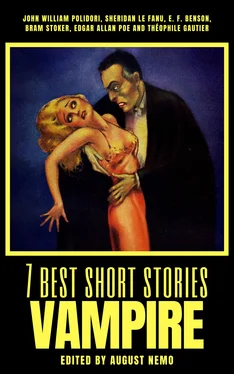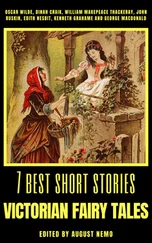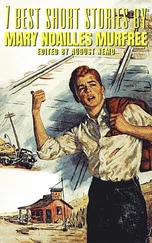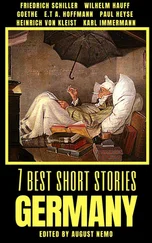1 ...7 8 9 11 12 13 ...20 I remember the nursery maid petting me, and all three examining my chest, where I told them I felt the puncture, and pronouncing that there was no sign visible that any such thing had happened to me.
The housekeeper and the two other servants who were in charge of the nursery, remained sitting up all night; and from that time a servant always sat up in the nursery until I was about fourteen.
I was very nervous for a long time after this. A doctor was called in, he was pallid and elderly. How well I remember his long saturnine face, slightly pitted with smallpox, and his chestnut wig. For a good while, every second day, he came and gave me medicine, which of course I hated.
The morning after I saw this apparition I was in a state of terror, and could not bear to be left alone, daylight though it was, for a moment.
I remember my father coming up and standing at the bedside, and talking cheerfully, and asking the nurse a number of questions, and laughing very heartily at one of the answers; and patting me on the shoulder, and kissing me, and telling me not to be frightened, that it was nothing but a dream and could not hurt me.
But I was not comforted, for I knew the visit of the strange woman was not a dream; and I was awfully frightened.
I was a little consoled by the nursery maid’s assuring me that it was she who had come and looked at me, and lain down beside me in the bed, and that I must have been half-dreaming not to have known her face. But this, though supported by the nurse, did not quite satisfy me.
I remembered, in the course of that day, a venerable old man, in a black cassock, coming into the room with the nurse and housekeeper, and talking a little to them, and very kindly to me; his face was very sweet and gentle, and he told me they were going to pray, and joined my hands together, and desired me to say, softly, while they were praying, “Lord hear all good prayers for us, for Jesus’ sake.” I think these were the very words, for I often repeated them to myself, and my nurse used for years to make me say them in my prayers.
I remembered so well the thoughtful sweet face of that white-haired old man, in his black cassock, as he stood in that rude, lofty, brown room, with the clumsy furniture of a fashion three hundred years old about him, and the scanty light entering its shadowy atmosphere through the small lattice. He kneeled, and the three women with him, and he prayed aloud with an earnest quavering voice for, what appeared to me, a long time. I forget all my life preceding that event, and for some time after it is all obscure also, but the scenes I have just described stand out vivid as the isolated pictures of the phantasmagoria surrounded by darkness.
A Guest
I am now going to tell you something so strange that it will require all your faith in my veracity to believe my story. It is not only true, nevertheless, but truth of which I have been an eyewitness.
It was a sweet summer evening, and my father asked me, as he sometimes did, to take a little ramble with him along that beautiful forest vista which I have mentioned as lying in front of the schloss.
“General Spielsdorf cannot come to us so soon as I had hoped,” said my father, as we pursued our walk.
He was to have paid us a visit of some weeks, and we had expected his arrival next day. He was to have brought with him a young lady, his niece and ward, Mademoiselle Rheinfeldt, whom I had never seen, but whom I had heard described as a very charming girl, and in whose society I had promised myself many happy days. I was more disappointed than a young lady living in a town, or a bustling neighborhood can possibly imagine. This visit, and the new acquaintance it promised, had furnished my day dream for many weeks
“And how soon does he come?” I asked.
“Not till autumn. Not for two months, I dare say,” he answered. “And I am very glad now, dear, that you never knew Mademoiselle Rheinfeldt.”
“And why?” I asked, both mortified and curious.
“Because the poor young lady is dead,” he replied. “I quite forgot I had not told you, but you were not in the room when I received the General’s letter this evening.”
I was very much shocked. General Spielsdorf had mentioned in his first letter, six or seven weeks before, that she was not so well as he would wish her, but there was nothing to suggest the remotest suspicion of danger.
“Here is the General’s letter,” he said, handing it to me. “I am afraid he is in great affliction; the letter appears to me to have been written very nearly in distraction.”
We sat down on a rude bench, under a group of magnificent lime trees. The sun was setting with all its melancholy splendor behind the sylvan horizon, and the stream that flows beside our home, and passes under the steep old bridge I have mentioned, wound through many a group of noble trees, almost at our feet, reflecting in its current the fading crimson of the sky. General Spielsdorf’s letter was so extraordinary, so vehement, and in some places so self-contradictory, that I read it twice over — the second time aloud to my father — and was still unable to account for it, except by supposing that grief had unsettled his mind.
It said “I have lost my darling daughter, for as such I loved her. During the last days of dear Bertha’s illness I was not able to write to you.
“Before then I had no idea of her danger. I have lost her, and now learn all , too late. She died in the peace of innocence, and in the glorious hope of a blessed futurity. The fiend who betrayed our infatuated hospitality has done it all. I thought I was receiving into my house innocence, gaiety, a charming companion for my lost Bertha. Heavens! what a fool have I been!
“I thank God my child died without a suspicion of the cause of her sufferings. She is gone without so much as conjecturing the nature of her illness, and the accursed passion of the agent of all this misery. I devote my remaining days to tracking and extinguishing a monster. I am told I may hope to accomplish my righteous and merciful purpose. At present there is scarcely a gleam of light to guide me. I curse my conceited incredulity, my despicable affectation of superiority, my blindness, my obstinacy — all — too late. I cannot write or talk collectedly now. I am distracted. So soon as I shall have a little recovered, I mean to devote myself for a time to enquiry, which may possibly lead me as far as Vienna. Some time in the autumn, two months hence, or earlier if I live, I will see you — that is, if you permit me; I will then tell you all that I scarce dare put upon paper now. Farewell. Pray for me, dear friend.”
In these terms ended this strange letter. Though I had never seen Bertha Rheinfeldt my eyes filled with tears at the sudden intelligence; I was startled, as well as profoundly disappointed.
The sun had now set, and it was twilight by the time I had returned the General’s letter to my father.
It was a soft clear evening, and we loitered, speculating upon the possible meanings of the violent and incoherent sentences which I had just been reading. We had nearly a mile to walk before reaching the road that passes the schloss in front, and by that time the moon was shining brilliantly. At the drawbridge we met Madame Perrodon and Mademoiselle De Lafontaine, who had come out, without their bonnets, to enjoy the exquisite moonlight.
We heard their voices gabbling in animated dialogue as we approached. We joined them at the drawbridge, and turned about to admire with them the beautiful scene.
The glade through which we had just walked lay before us. At our left the narrow road wound away under clumps of lordly trees, and was lost to sight amid the thickening forest. At the right the same road crosses the steep and picturesque bridge, near which stands a ruined tower which once guarded that pass; and beyond the bridge an abrupt eminence rises, covered with trees, and showing in the shadows some grey ivy-clustered rocks.
Читать дальше

![Коллектив авторов - Best Short Stories [С англо-русским словарем]](/books/26635/kollektiv-avtorov-best-short-stories-s-anglo-thumb.webp)










